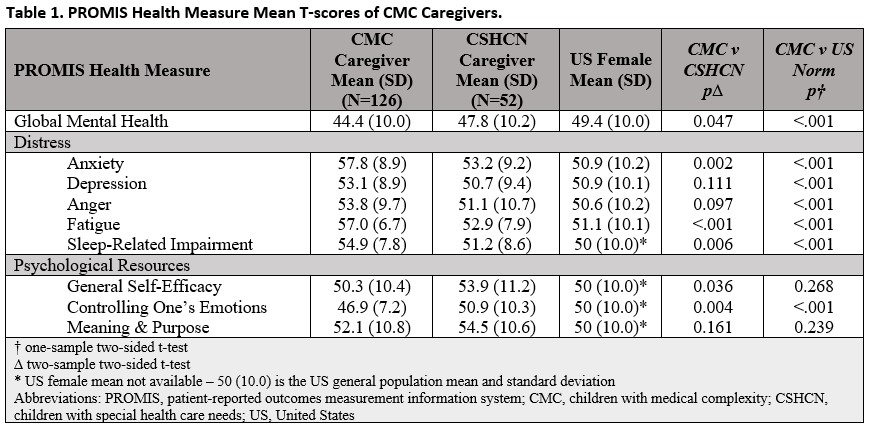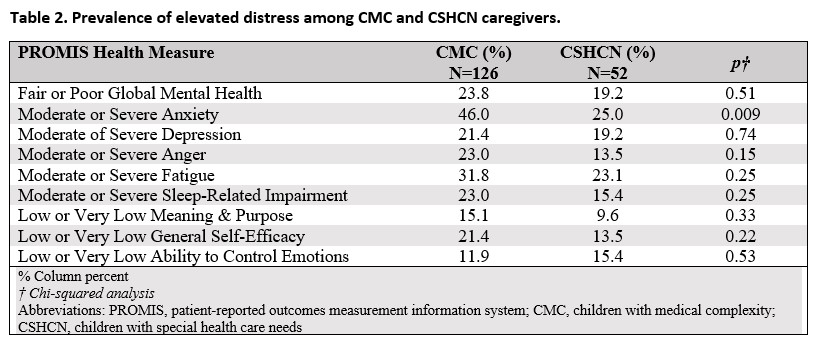Children with Chronic Conditions
Category: Abstract Submission
Children with Chronic Conditions III
602 - Self-Reported Mental Health of Family Caregivers of Children with Medical Complexity
Monday, April 25, 2022
3:30 PM - 6:00 PM US MT
Poster Number: 602
Publication Number: 602.403
Publication Number: 602.403
Lydia M. McLachlan, UPMC Children's Hospital of Pittsburgh, Pittsburgh, PA, United States; Stacey Engster, Jose F Alvarado and Associates, Salisbury, MD, United States; Justin A. Yu, UPMC Children's Hospital of Pittsburgh, Pittsburgh, PA, United States
.jpg)
Justin A. Yu, MD, MSc (he/him/his)
Assistant Professor
UPMC Children's Hospital of Pittsburgh
Pittsburgh, Pennsylvania, United States
Presenting Author(s)
Background: Family caregiver mental health impacts caregiver’s ability to care for their child. Our understanding about the mental health of caregivers of children with medical complexity (CMC) and how it compares to typical US adults and family caregivers of other pediatric populations is limited.
Objective: To 1) describe self-reported mental health among CMC family caregivers, and 2) compare to the US general adult population and family caregivers of children with special health care needs (CSHCN).
Design/Methods: We enrolled family caregivers of CMC receiving care at a pediatric complex care center and family caregivers of CSHCN receiving care at a CSHCN medical home (both situated within a tertiary-care children’s hospital) to complete a survey from May 2021 to December 2021. Patient-Reported Outcomes Measurement Information System (PROMIS) instruments assessed caregiver mental health across multiple domains including global mental health, emotional distress, and psychological resources. We used summary statistics to describe caregiver PROMIS scores and t-tests to compare PROMIS mean scores of CMC caregivers to US population norms and PROMIS mean scores of caregivers of CSHCN. Chi-squared analyses examined the relationship between child medical complexity status and elevated levels of emotional distress (e.g., moderate or severe symptoms of anxiety) among family caregivers.
Results: Among 126 CMC family caregivers, mean scores for PROMIS global mental health, anxiety, depression, anger, fatigue, sleep-related impairment, and controlling one’s emotions were significantly poorer than the general US population (Table 1; all p Conclusion(s): Family caregivers’ of CMC self-report of mental health is significantly poorer than the US general population and family caregivers of CSHCN across multiple domains. Child medical complexity status seems to be associated with clinically significant levels of emotional distress among family caregivers, however further research is needed.
Table 1. PROMIS Health Measure Mean T-scores of CMC Caregivers.
Table 2. Prevalence of elevated distress among CMC and CSHCN caregivers.
Objective: To 1) describe self-reported mental health among CMC family caregivers, and 2) compare to the US general adult population and family caregivers of children with special health care needs (CSHCN).
Design/Methods: We enrolled family caregivers of CMC receiving care at a pediatric complex care center and family caregivers of CSHCN receiving care at a CSHCN medical home (both situated within a tertiary-care children’s hospital) to complete a survey from May 2021 to December 2021. Patient-Reported Outcomes Measurement Information System (PROMIS) instruments assessed caregiver mental health across multiple domains including global mental health, emotional distress, and psychological resources. We used summary statistics to describe caregiver PROMIS scores and t-tests to compare PROMIS mean scores of CMC caregivers to US population norms and PROMIS mean scores of caregivers of CSHCN. Chi-squared analyses examined the relationship between child medical complexity status and elevated levels of emotional distress (e.g., moderate or severe symptoms of anxiety) among family caregivers.
Results: Among 126 CMC family caregivers, mean scores for PROMIS global mental health, anxiety, depression, anger, fatigue, sleep-related impairment, and controlling one’s emotions were significantly poorer than the general US population (Table 1; all p Conclusion(s): Family caregivers’ of CMC self-report of mental health is significantly poorer than the US general population and family caregivers of CSHCN across multiple domains. Child medical complexity status seems to be associated with clinically significant levels of emotional distress among family caregivers, however further research is needed.
Table 1. PROMIS Health Measure Mean T-scores of CMC Caregivers.

Table 2. Prevalence of elevated distress among CMC and CSHCN caregivers.

